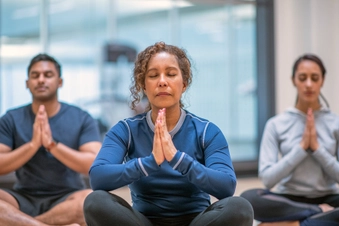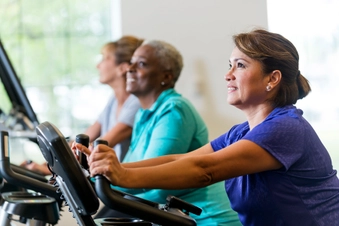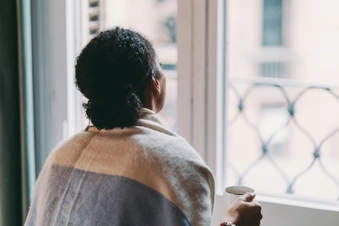Lower Your Stress Level When You Have Metastatic SCLC

Know Your Limits
Daily life with metastatic SCLC can be a challenge, so let your loved ones know when you need a mental or physical break. That’ll help you save energy for things that are important to you. Be specific about what you need. For example, tell friends and family if you need time away from talking about your illness. Or maybe you just need someone to pick up the groceries or walk the dog.

Meditate
There’s a reason this practice has been around for thousands of years. It’s been shown to relax the body and mind. It may also lessen your cancer-related pain, anxiety, and stress. You can meditate in lots of ways. Try focused methods such as a body scan relaxation, guided imagery, or mindful breathing. Or try a physical form through tai chi, qi gong, walking, or yoga.

Get a Massage
This kind of therapy can release feel-good chemicals (endorphins) to help you relax. On top of that, it may ease muscle and nerve pain from cancer or cancer treatments. You may also notice less swelling and stress after a massage. If you feel good during the day, you might sleep better at night.

Control What You Can
It’s easy to get lost in the parts of your diagnosis that you can’t control. But you may feel less stressed if you focus on things you can, such as eating a balanced diet, exercising on a regular basis, and getting enough sleep. These healthy habits may give you more energy to deal with whatever cancer throws your way.

Exercise More
Regular physical activity can lessen physical side effects from cancer treatment and ease your shortness of breath. It can also head off depression and anxiety and give you more strength and confidence to do daily tasks. It’s generally safe to exercise during and after lung cancer treatment. But you should check with your doctor to come up with a routine that’s right for you.

Find Meaning in Life
Spirituality and religion may soothe your worries around cancer, boost your emotional and physical health, and give you a sense of hope and peace. But everyone’s beliefs and needs are different. You may find stress relief and meaning through prayer, meditation, or a connection with other people. Your doctor or social worker can refer you to a chaplain or find programs to boost your spiritual well-being.

Join a Support Group
No one deserves to get lung cancer. But you may feel guilty or unfairly judged about being sick, especially if you’re a smoker. It can be easier to talk about your illness around people who know what you’re going through. Find free online support groups through websites like Cancer Support Community, LUNGevity, the American Lung Association, and CancerCare.

Catch Your Breath
Lung cancer can give you breathing problems. You may feel more anxious when you’re short of breath. If you panic, you can get even more breathless. Tell your doctor if you have a hard time breathing. They can ease your symptoms. You might benefit from medication or techniques like belly breathing.

Talk to a Cancer Counselor
Ask your doctor to refer you to a mental health professional who treats people who have cancer. You may hear them called oncology psychologists or psycho-oncologists. They know a lot about the kinds of stressors you might face. And they’ll help you learn how to manage the specific problems that trouble you most.

Accept Your Feelings
You might feel different hour by hour or day by day. That’s OK. But tell your doctor if you’re having trouble getting a handle on your feelings. You can learn how to become more aware of your thoughts and emotions without judging them. This is called mindfulness. Studies show this kind of acceptance might help you manage your stressors a little more easily.

Try Mindfulness-Based Stress Reduction (MBSR)
This is an evidence-based program that teaches you how to use mindfulness in your daily life. It may include meditation and yoga. Studies show MBSR can help lessen stress and fatigue in people who have cancer. It might also boost your mood, help you sleep better, and support your immune system.

Do Something Fun
It’s good to distract yourself in a positive way when you start to get too overwhelmed. Watch a funny movie, go out for a good meal, or hang out with your friends or family. After you take a break, you might be able to handle your stress and anxiety in a more controlled way.

Get Enough Sleep
Adults need about 7 to 9 hours of shut-eye a night, but many people with lung cancer find it hard to fall or stay asleep. Symptoms such as shortness of breath, pain, depression, or anxiety may have you tossing and turning at night. Your stress levels may go up if your sleep quality goes down, so tell your doctor if you have problems getting enough sleep. They’ll help you manage the physical and emotional symptoms that keep you awake.

Get Supportive Care
Your cancer care team can help you manage the mental and physical side effects that come from cancer or cancer treatment. This is called palliative care or supportive oncology. Studies show that people with SCLC who get supportive care at the beginning of their treatment tend to live longer than those who don’t. But it’s good to ask for help at any point after your diagnosis, even long after your treatment is over.

Try Music or Art Therapy
Studies show that creative outlets may boost your quality of life. You can sing, listen to music, play an instrument, or make art. These may also lessen cancer-related anxiety, depression, and pain. Music therapy may also help you breathe easier, sleep better, lower your blood pressure, and slow your heart rate. Ask your social worker if there are groups and classes you can join.
Show Sources
IMAGES PROVIDED BY: 1) Slingshot / Getty Images 2) FatCamera / Getty Images 3) michaeljung / Getty Images 4) TwilightShow / Getty Images 5) kali9 / Getty Images 6) krisanapong detraphiphat / Getty Images 7) SDI Productions / Getty Images 8) FluxFactory / Getty Images 9) izusek / Getty Images 10) martin-dm / Getty Images 11) styf22 / Getty Images 12) izusek / Getty Images 13) Wavebreakmedia / Getty Images 14) katleho Seisa / Getty Images 15) Vladimir Vladimirov / Getty Images
SOURCES: Tim Pearman, PhD, professor, medical social sciences and psychiatry and behavioral sciences, Northwestern University Feinberg School of Medicine, Chicago. Cancer.Net: “Managing Stress.” American Cancer Society: “Take a Moment With Meditation,” “6 Tips for Managing Stress.” Memorial Sloan Kettering Cancer Center: “Meditations.” Dana-Farber Cancer Institute: “How Integrative Therapies Can Help Lung Cancer Patients,” “Exercising with lung cancer.” NorthShore University HealthSystem: “Benefits of Massage Therapy for Cancer Patients.” Journal of Alternative and Complementary Medicine: “Providing Massage Therapy for People with Advanced Cancer: What to Expect.” The Oncologist: “Physical Activity and Exercise in Lung Cancer Care: Will Promises Be Fulfilled?” Journal of Pastoral Care Counseling: “Improving Spiritual Well-Being in Patients with Lung Cancers.” Cancer: “Religion, Spirituality, and Physical Health in Cancer Patients: A Meta-Analysis.” National Cancer Institute: “Spirituality in Cancer Care (PDQ) -- Patient Version.” Revista da Escola de Enfermagem da USP: “Effectiveness of prayer in reducing anxiety in cancer patients.” Cancer Support Community (Gilda’s Club): “Lung Cancer,” “Serving People Impacted By Cancer.” Support Care Cancer: “A qualitative study of online support communities.” University of Rochester Medical Center: “Lung Cancer: Managing Shortness of Breath.” NYU Langone Health, Perlmutter Cancer Center: “Support for Small Cell Lung Cancer.” |